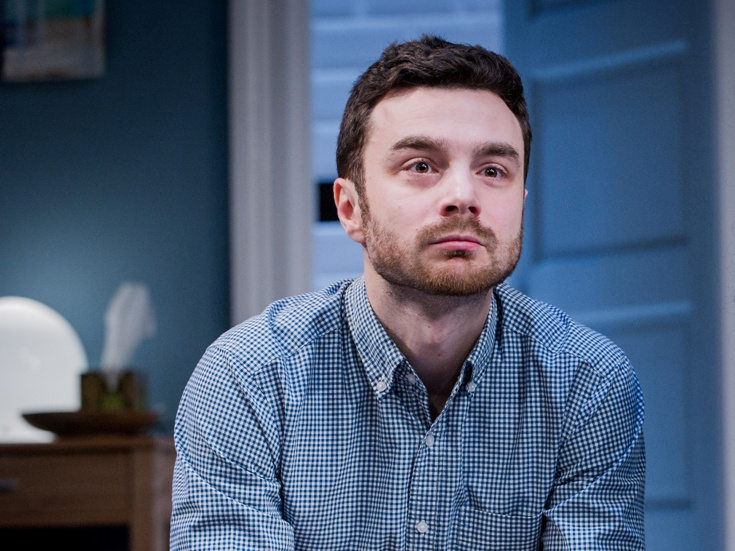Ilan Goodman on Bad Jews Getting Banned on the Tube, Landing The Imitation Game & Giving Notes to His Famous Dad

(Photo by Robert Workman)
Ilan Goodman may be the son of Olivier Award-winning actor Henry Goodman (Assassins, Chicago) but the RADA-educated performer has been carving a name for himself as a fine talent in his own right. He can currently be seen at the West End's Theatre Royal Haymarket reprising his acclaimed performance as Liam in Joshua Harmon’s play Bad Jews. Broadway.com met the engaging actor to talk fractious onstage families and giving notes to his famous father offstage.
This production of Bad Jews is the little show that won’t quit.
I know, right? We started in a studio theater in Bath and came to the St. James and then the Arts Theatres in London and here we are for a further run at the Haymarket, which is a very nice surprise. I wasn’t anticipating this.
How does it feel to be revisiting the play?
I love the material, and being back in rehearsal has been about rediscovering how [Harmon] structures the debate that drives the play [which is about a Jewish family’s squabble over a cherished heirloom]. I find that the play is fascinatingly ambivalent about its position on things, and that both Liam and his cousin Daphna offer powerful arguments.
Do you have any thoughts as to the play’s unexpected success in London?
Having spoken to many people in the foyer afterwards, I think the tension that the play explores between cultural and religious heritage and secular modernity is something everyone faces. Many different people can connect to that basic struggle.
Regardless, presumably, of their religion?
Absolutely. Many non-Jews have enjoyed the show enormously and recognize the situation it describes—the family tension and the brutal way in which the characters treat each other, which is both recognizable and at times very funny.
Were you surprised originally by the rather provocative title?
At first it gave me a thrill because it’s just so edgy. I have sympathy with people who find the title uncomfortable, but I just think it fits the play so well—it has the same edginess that the play has.
It proved too much for London Underground, who last time around banned the poster for the play on the tube.
That really did surprise me because I think it’s really clear from the poster that the play is essentially a comedy and stuff. People have said that the attention [surrounding the ban] helped us but I don’t think it could ever replace the sustained exposure that a tube poster gives you.
I gather Michael Zegen—who played Liam in the off-Broadway production—came to see the show in London.
He did and as you can imagine, I was a little self-conscious at the time but he was very charming and we managed to compare our productions in a few respects without it being too awkward [laughs].
Were there any notable differences?
Apparently Michael would keep going back into the kitchen to get food, which became a running gag and is very different to the way I do it. I’ve remained friends with him on Facebook—he's currently in A View From the Bridge on Broadway.
Your performance proves yet again how good you are at playing Americans, which I recall as far back as your Old Vic appearance in 2010 in Six Degrees of Separation.
That’s reassuring to hear. I love playing Americans and don’t really understand why except that it feels right—it seems to fit me somehow. Something to do with my sensibility and temperament.
American accents are getting better and better across the London stage, I think.
That’s probably because we’re all sort of addicted to long-form American TV shows. Maybe the dialect coaches have got better, as well [laughs].
Have you ever lived in the States?
I’ve never lived there or tried to work there but I have certainly been to visit. I went to see my dad on Broadway in The Producers and also in Tartuffe.
What did your father, Henry, think of your decision to become an actor?
There was an attempt to kind of warn me as to the reality of the life I was heading towards, so I can’t say that it felt in any way preordained. It was more that acting was just the thing I loved most and even though I did psychology and philosophy at university, I had no aspirations to pursue those professionally.
Do you have an early memory of seeing your dad onstage?
I remember loving him in Chicago [the 1997 London revival, in which Goodman senior played Billy Flynn opposite Ute Lemper and Ruthie Henshall] and even giving him notes! I told him to be cooler because he wasn’t cool enough—but he was by press night [laughs].
Would you and he do a show together?
Absolutely—we’re very keen but it has to be something that really suits us both, especially if we’re going to invite that sort of comparison. We’re certainly up for it.
So far you seem to have sidestepped musicals in your own career?
I have done musicals, in fact, but smaller ones that you may not have seen. But it’s true that I’ve done more straight theater, though I’m very much aware that musicals are part of the repertoire.
What about film? I see you were in The Imitation Game.
Yes, I was one of the code breakers. It was fun to be part of a big movie, and I was very excited about doing something about Alan Turing; I’m very interested in him and his ideas.
You've now done Bad Jews in three different theaters in London. Do you foresee a fourth?
[Laughs] I think I need to stop after this, although who knows? It’s such a rare part and such a brilliant play.